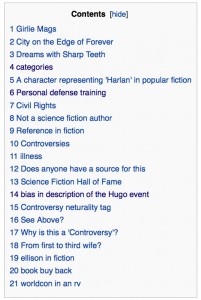I’ve been thinking about an emergent aspect of my Wikipedia use that almost inverts the software’s intended design. That is: I’ve started to use Wikipedia’s Talk pages as if they were extensions of the articles themselves, especially for pages with controversial content. In some cases, I’m even finding the material on the Talk pages more informative and reliable than what ends up on the official page. The reason for this is that the public pages tend to carry only what a group of self-selected and often partisan editors can agree on; in addition, pages must meet Wikipedia’s own standards of neutrality and verifiability. Thus a lot of pages slowly morph towards the kind of pablum that public relations flacks generate. Since value judgments are frowned on, contextual analyses tend to get squeezed out in favor of a laundry list approach to any given subject: X did this, and then she did that, and then she did this other thing. What this means is that if you really want to get any kind of handle on a subject, you have to delve into the page history and the inter-editor discussions of the Talk page.
I first noticed that this had become a reflexive habit a while ago when I followed a series of links on sexual harassment, computer games, and science fiction and ended up on science fiction author Harlan Ellison’s Wikipedia page. There is a subsection on that page about controversies Ellison has been involved in, including an incident in which he groped a fellow science fiction author, Connie Willis, during the 2006 Nebula awards. (There is a YouTube video of this.) I immediately turned to the Talk page, knowing there would likely be a discussion about whether that incident should be included in his page and how it should be handled, and maybe also some indication of the larger context in which it took place. With luck, I would find out more about both the incident and Ellison himself, since he’s not a writer whose work I know well—and his Wikipedia page is an excellent example of the laundry list phenomenon mentioned above. Talk is where Wikipedia wants content discussions to happen, and the result is that Talk is where a good deal of information ends up that is not yet sourced and where the arguments over meaning and context occur. As it happened, there wasn’t much more about the Willis incident, though there was a good deal more in support of the general view that Ellison is a petty and vindictive person with sociopathic tendencies—some of which has since been excised from the Talk page through a neutering process that parallels that of the main page. (The page on Ellison currently frames him as “abrasive and argumentative,” a phrase that hardly covers groping a colleague.)
If journalism is the first draft of history, then Talk is clearly intended as notes towards a first draft of Wikipedia. But like journalism vis-a-vis history, it has the unfiltered—or at most semi-filtered—quality of all primary sources, making it equally valuable and suspect. Andrew Leonard has an interesting recent post on the editors who use Wikpedia to pursue private vendettas, and Talk is one of the places where that kind of social engineering is most visible, because Talk is as much a contest over desire and between competing agendas as it is over content. Wikipedia—unlike its predecessors such as Encyclopedia Britannica—wants to pretend that knowledge equals facts minus interpretation. The shadow encyclopedia that is Wikipedia Talk shows up the naivete of that approach.
